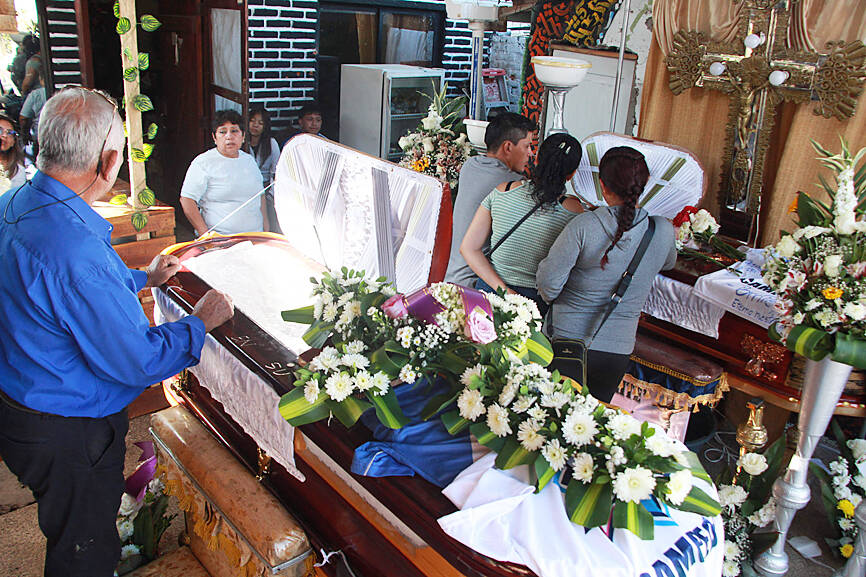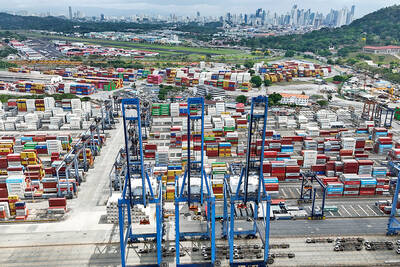Gunmen shot dead at least seven people at a pool hall in the Ecuadoran city of Santo Domingo, police said on Sunday, in the nation’s latest gruesome massacre amid soaring gang violence.
“Seven people died from gunshot wounds” at a pool hall in the nightlife district of Santo Domingo, about 150km west of the capital, Quito, national police said in a WhatsApp group with reporters.
Police said they were investigating the incident and hunting for those responsible.

Photo: AFP
Purported security camera footage of the massacre circulating online showed several attackers wearing black masks open fire on two men standing at the entrance to the pool hall, sending pedestrians scrambling.
The gunmen then entered the hall and continued shooting, fleeing before a police vehicle approached.
Local media reported that preliminary investigations indicated that the killings might be related to organized crime in the region. A similar pool hall massacre took place last month in the southwestern tourist city of Playas, leaving at least nine dead. In April, armed men killed 12 people at a cockfighting ring about 30km from Santo Domingo.
Once considered a bastion of peace in Latin America, Ecuador has been plunged into crisis after years of expansion by transnational cartels that use its ports to ship drugs to the US and Europe.
Drug trafficking organizations have been multiplying in Ecuador, where the homicide rate rose from six per 100,000 residents in 2018 to 38 per 100,000 in last year.
Between January and May, there were more than 4,051 homicides, according to official figures.
Ecuadoran President Daniel Noboa’s government has promised to crack down on crime, but despite widespread operations and constant states of emergency, there has been little reduction in the violence.
At the weekend alone, 14 people were killed in massacres in the troubled province of Guayas, one of four provinces where Noboa declared a state of emergency to combat gang violence.
Gangs vying for control of drug trafficking routes in Ecuador have taken advantage of the nation’s strategic location, its US-dollar-based economy and the corruption of some authorities.

THE TRAGEDY OF PUNCH: Footage of the seven-month-old Japanese macaque has gone viral online after he was rejected by his mother and formed a bond with a soft toy A baby monkey in Japan has captured hearts around the world after videos of him being bullied by other monkeys and rejected by his mother went viral last week. Punch, a Japanese macaque, was born in July last year at Ichikawa City Zoo. He has drawn international attention after zookeepers gave him a stuffed orangutan toy after he was abandoned by his mother. Without maternal guidance to help him integrate, Punch has turned to the toy for comfort. He has been filmed multiple times being dragged and chased by older Japanese macaques inside the enclosure. Early clips showed him wandering alone with

South Korea would soon no longer be one of the few countries where Google Maps does not work properly, after its security-conscious government reversed a two-decade stance to approve the export of high-precision map data to overseas servers. The approval was made “on the condition that strict security requirements are met,” the South Korean Ministry of Land, Infrastructure and Transport said. Those conditions include blurring military and other sensitive security-related facilities, as well as restricting longitude and latitude coordinates for South Korean territory on products such as Google Maps and Google Earth, it said. The decision is expected to hurt Naver and Kakao

Australian Prime Minister Anthony Albanese yesterday said he did not take his security for granted, after he was evacuated from his residence for several hours following a bomb threat sent to a Chinese dance group. Albanese was evacuated from his Canberra residence late on Tuesday following the threat, and returned a few hours later after nothing suspicious was found. The bomb scare was among several e-mails threatening Albanese sent to a representative of Shen Yun, a classical Chinese dance troupe banned in China that is due to perform in Australia this month, a spokesperson for the group said in a statement. The e-mail

‘OCCUPATION’: Hong Kong said it had lodged ‘stern protests’ with Panama’s consulate, and would ‘staunchly support’ the rights and interests of Hong Kong companies Panamanian President Jose Raul Mulino on Monday ordered the temporary occupation of two ports run by a unit of CK Hutchison Holdings Ltd following the Supreme Court’s ruling against the firm’s concession, escalating a dispute that has become a proxy battle between the US and China in Latin America. Mulino said in a speech that the administration and operation of the two ports on the strategic Panama Canal is to revert to the country’s National Maritime Authority to ensure their uninterrupted, safe and efficient operation. The occupation covers movable equipment at the ports and does not mean a definitive loss of